Sponsored by Holiday House
Piper was raised in a cult. She just doesn’t know it.
Now Piper is living Outside. Among Them. With a woman They claim is her real mother.
But Piper knows better.
And Piper is going to escape.
From debut YA author Megan Cooley Peterson comes a thrilling inside look at religious cults, inspired by her own childhood experience.
Hey YA Readers!
It’s my favorite newsletter of the season: it’s my turn to discover what your favorite books of 2019 were. I love hearing from you and finding out about books I may have overlooked and need to make sure I have on my end-of-year TBR.
As always, I’m asking for you to share the book published for YA readers in 2019 that was your favorite. I’ve got another option for you to also share your favorite under-the-radar 2019 YA book. The form is here, and you have until December 9 to answer (that’s one week!). I’ll send a reminder in Thursday’s newsletter.
You know those signs you see sometimes and think “why did they need to make such a dumb sign for something so obvious?” Here’s a version of that sign, but for this “best of” — don’t stuff the box. I know when there’s a coordinated campaign to get a book on the list, and I’ll just not include it. I want to know your favorite book and what book you wish got more attention because I care about your thoughts.
Now that we’ve got that, here’s the form again.
It seems only fair then that I pull together a few of my favorite 2019 YA reads for your own to-read lists. I’ve not included some of the mega big books, as I want to highlight some of the quieter books that may have fallen under the radar this year.
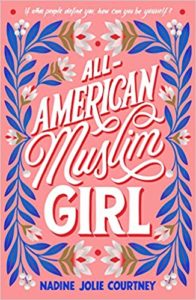 All American Muslim Girl by Nadine Jolie Courtney
All American Muslim Girl by Nadine Jolie Courtney
This is such an excellent read about a Muslim girl coming to understand her faith and how to speak up and out about it. She’s white — she’s Muslim via the Caucus region — and the book dismantles white privilege and how it is so easily tied into religion. There’s a romance here complicated by the fact that the romantic interest’s father is an outspoken conservative TV news host, and his views on Allie’s religion are, well, not nice ones. The romance is complicated and satisfying.
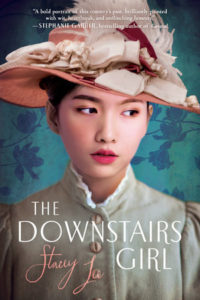 The Downstairs Girl by Stacey Lee
The Downstairs Girl by Stacey Lee
Stacey Lee writes my favorite historical YA, and her latest highlights something I never knew about Chinese immigrants in America. It’s 1890 Atlanta. Jo, who is unafraid to speak her mind, lives with Old Gin — a man who took her in after she was “abandoned” by her parents — under the house of a local publisher who is unaware that they live there. When Jo overhears the folks upstairs talking about how agony aunt columns have led to newspaper sales soaring, she takes it upon herself to suggest a column and does so through a pen name “Miss Sweetie.” They’re game for it, and she begins to write these regular columns under the name and under strict anonymity. Sales are up . . . and so is interest in finding out who she really is.
This isn’t, of course, only about others discovering who Jo is. It’s about Jo discovering who she is and the serious family secrets going on around her. It’s a book about early feminism and how white it was and how girls and women of color like Jo (who is Chinese American) were shut out and discriminated against in the name of “equality.”
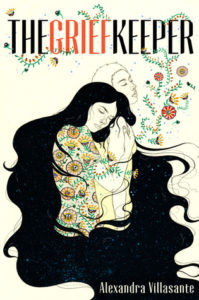 The Griefkeeper by Alexandra Villasante
The Griefkeeper by Alexandra Villasante
This is a book that’s painfully timely and while not entirely realistic — it’s speculative fiction — feels not out of the realm of possibility. The story follows Marisol and her younger sister, are seeking asylum in the US from El Salvador, where their lives are at great risk for numerous reasons. They’re being held in a detention facility, and when Marisol’s interview goes less-well than she hoped, she uses a break in the guard’s attention to flee. She’s approached by a woman who offers her a once-in-a-lifetime opportunity — there’s a new procedure that needs a human test subject. The procedure will remove the traumas from someone suffering and give them to an otherwise healthy individual. Marisol can be the participant, in exchange for her asylum request. Fearing deportation, she agrees.
In addition to being about the ways immigrants are treated, there is a queer relationship that develops in the story that only makes the power of love, of connection, and of the need to change how we treat one another as fellow humans shine more strongly.
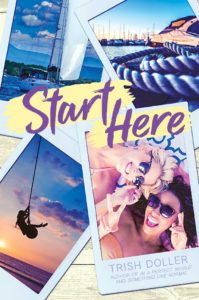 Start Here by Trish Doller
Start Here by Trish Doller
Willa, Taylor, and Finley were inseparable friends, though Finley was the glue holding the trio together. When they were young, they made a promise to sail from their home in Ohio through the Great Loop and down to the Florida Keys to celebrate the end of high school. Unfortunately, Finley dies from leukemia before she gets to take the trip but leaves Willa and Taylor with a set of clues for their trip that will honor her memory, as well as allow the two of them to bond outside of their relationship to her.
This is a fresh take on the road trip story, taking place entirely on a sailboat that navigates a series of locks, rough waters (literally and figuratively), as well as a rough hurricane. Willa is a mixed-race girl and Taylor is bisexual, and their identities play a role in the story as Willa confronts the realities of her race, as well as her economic challenges, while Taylor, who has access to much more than Willa, grapples with that as well as with who she feels she’s ready to share her sexuality with. These become trigger points throughout the journey that ultimately help Willa and Taylor find love not just for their shared friend, but also for one another.
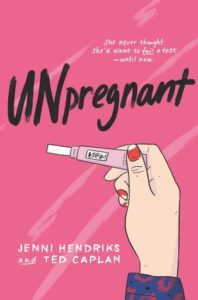 Unpregnant by Jenni Hendriks and Ted Caplan
Unpregnant by Jenni Hendriks and Ted Caplan
This story shouldn’t seem like it’s funny and yet, it is absolutely hilarious. Veronica is a girl who needs to get an abortion after her boyfriend tampers with a condom (he didn’t want her to leave for college) and when the scariest girl in school discovers her pregnancy, the two of them set off across state lines to get her the legal abortion for the weirdest and most uncomfortable road trip. Along the way, Veronica discovers she’s allowed herself to become a person who believes she’s better than everyone else, and Bailey allows her story to become better known and embrace vulnerability. It’s an awesome friendship story which also balances the serious realities of access to reproductive care, especially for teenagers, today.
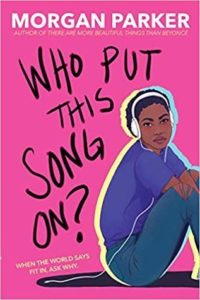 Who Put This Song On? by Morgan Parker
Who Put This Song On? by Morgan Parker
I really hope this book doesn’t fall off people’s radars because it’s the funniest book about depression I’ve ever read — as well as one that is essential for understanding the intersections of race and mental illness. Based on Parker’s own teenage years, the Morgan in the story navigates life in a conservative southern California town, attending a religious school, and the realities of having depression and anxiety in biting, raw, and unapologetic ways. Read the story for the story, but do not skip out on Parker’s powerful author’s note and resources at the end.
A few other favorites of mine this year include:
- Black Enough edited by Ibi Zoboi
- Brave Face by Shaun David Hutchison
- The Exact Opposite of Okay by Laura Steven
- The Revolution of Birdie Randolph by Brandy Colbert
- The Stars and the Blackness Between Them by Junauda Petrus
- We Speak In Storms by Natalie Lund
ICYMI…
Over on site in the last week:
- Gold YA fantasy books from 2019 — both in the design way and in the content way!
- Speaking of gorgeous YA books.
- Add some awesome 2019 queer YA fantasy to your to-read.
- Why One Of Us Is Lying has given some readers pause.
- Want to use The Hate U Give in the classroom or for a book club? Here’s a reading guide and discussion questions.
That’s all for today. Thanks for hanging out, and don’t forget to share your favorite YA of 2019.
— Kelly Jensen, @heykellyjensen on Instagram and editor of (Don’t) Call Me Crazy and Here We Are.
